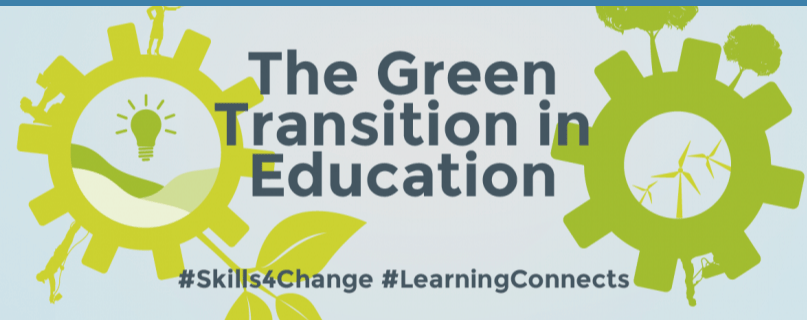The transition to a more ‘green’ and environmentally sustainable economy requires education and training systems to support the overall process. The role of vocational education in enabling the transition as part of the European Green Deal, the United Nations’ Sustainable Development Goals (SDGs) and country targets of net-zero carbon emissions, was the focus of this Wednesday’s LearningConnect session, which was broadcast live on Facebook, LinkedIn and YouTube.
The webinar was titled “LearningConnects: Green skills & Vocational teachers”. The speakers were Mervi Jansson, CEO at Omnia Education Partnership, Finland; Julian Stanley, VET Teachers and Trainers Specialist at ETF; and Romain Boitard, Specialist in Human Capital Development at ETF.
The need for green skills is a pressing issue for economies to successfully move away from carbon-intensive lifestyles and industries by 2050, if not earlier. While such targets may seem a long way off, given the magnitude of change required, time is ticking. “There is a need for systemic changes, but also at an individual level. That is why the transfer of competencies, values, attitudes and behaviours need to be given priority in education, and for continual education,” said Boitard.
Education is considered key to preparing for the changes ahead, in the world of work and in communities. While making green skills an integral part of curricula can be imposed from the top-down, there is a need for educators to be fully on-board, said Stanley. “Teachers are the driving belt of educational change. Without them on-board, it’s not going to work,” he said.
Teachers will require the right skills to teach sustainability, from knowing the science of climate change and environmental degradation, to applying that in the classroom and in the work place.
“There needs to be a recognition of how to prioritise these issues and turn them into action. In this world, as we see targets set and missed, it’s not always a lack of understanding or skills, but what to prioritise, to make hard decisions about what is important and what’s not,” said Stanley.
Particular pedagogical skills may require multi-disciplinary acumen for teachers to enable students, both young and old, to develop the right know-how in particular subjects and areas of work. This will necessitate working with businesses, industries and entrepeneurs to collectively find solutions to the global challenges of climate change.
Finland has been doing just that, with green skills being taught at vocational schools nationwide for the past five years, integrated with the UN’s SDGs. Vocational training is then applied at the regional level with local enterprises – there are some 3,000 companies in the greater Helsinki area working with the Omnia Education Partnership. “It is a win-win situation, and very much part of how companies want to, and need to, develop the Finnish economy,” said Jansson.
The first pilot project involved some 120 vocational schools. A survey showed that 60% of respondents were very familiar with green skills and SDGs as part of vocational training, and over 70% had integrated such skills into studies, but only 26% said it occurred in work-place learning. “That shows that a lot still has to be done,” she said. As part of its moves to evolve the curriculum of vocational training, Finland has recently introduced an elective module on climate responsibility.
The transition to green economies has already upended the labour market, and it is going to change fast in the immediate future. According to an International Labour Organisation (ILO) study, 24 million jobs could be created in the next decade as part of the green transition. If businesses prioritise ‘nature positive solutions’, some 250 million jobs could be created over the next decade, according to the World Economic Forum (WEF).
“Without a trained workforce the transition is not possible. There’s already evidence of a skills gaps that is causing bottle-necks for various sectors – in energy, the renovation of buildings, construction, and manufacturing, which are all looking for green skills,” said Boitard.
The Finnish experience has highlighted the need to focus on mindsets to enable individuals to think and act in a responsible and sustainable way. “What is important is the right mindset as that creates action, and in how it is embedded in the curriculum,” said Jansson.
A ‘green’ mindset impacts the educational institution and the wider community, and carries on to the work place. “Young students find it interesting to look at a new profession with sustainable glasses on,” she added.
Adapting curriculum to include green skills may be challenging, conceded Stanley, with schools not always having complete freedom to innovate, but ways of improving the existing curriculum can be explored, particularly with the emergence of new occupations.
To address the current challenges in teaching green skills, EFT’s Network of Excellence is working with some 150 experts and providers in Europe and elsewhere. “It is about finding solutions and sharing it with others,” said Stanley.
Out of 100 centres in the network, ETF has found that environmental awareness is high, at 75%, while addressing green skills within the curriculum is also high, at 75%. Introducing new curriculum for new occupations has proved harder, with a third doing so, while preparing teachers and learners is around 45%.
However, only 18% of centres are on target for meeting the zero-carbon emissions and related targets set for 2030 and 2050. “While that is worrying, it is also good, as its an honest recognition of how far we have to go to realistically get people to reflect on the challenges,” said Stanley.
To further develop some of the issues discussed in the webinar, the ETF is to host a week-long conference in June on building lifelong learning systems and skills for green and inclusive societies in the digital era.
To re-watch the discussion, here: https://fb.watch/4U0EPr22ds/






Leave a Reply